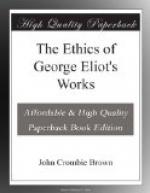betray a nature not attuned to the highest and noblest
pitch, and that cannot be expected to stand in the
hour of trial. His first direct lapse is when,
against his secret conviction, he supports Tyke as
hospital chaplain in opposition to Farebrother; but
mainly in mere defiance and resentment of the general
style of his reception at the Board meeting, and the
opposition he encounters there. Anon comes his
marriage to Rosamond Vincy,—a marriage
prompted by no true affection, but solely by the fascination
of her prettiness, her external grace and accomplishments.
Led on mainly by his own taste for luxury and external
show, he plunges into extravagances of every kind.
Debt inevitably follows, crippling his resources,
cramping his energies, fettering him as regards all
his higher professional aims and efforts. To
his wife he looks in vain for sympathy or aid.
She only aggravates the difficulties and harassments
of his life by her callous selfishness, her dull obdurate
insistance on all her own claims, her mean deceits
and concealments. Embarrassments of every kind
thicken around him; and at last in the all but universal
estimation of his fellows, and nearly in his own,
in the hope of temporary relief he becomes accessory
to murder. His end is as sad a one for his character,
and in his circumstances, as can well be conceived:
falling from all his high if somewhat arrogant professional
aims, his hopes of elevating the general practitioner,
and of raising medicine from an art to a science, into
the fashionable London lady’s doctor.
Though Mr Farebrother occupies a somewhat less prominent
place in the narrative, he is delineated with not
less consummate skill. He comes before us at
first a man of genial kindly sympathies, frankly alive
to, and frankly acknowledging, his own deficiencies.
There is an utter absence of pretence and affectation
about him, a graceful and engaging simplicity and
frankness of whole nature, that can hardly fail to
win the heart. All his home relations—toward
mother and sisters—are singularly touching.
Feeling all his defects as a clergyman, half laughing,
half apologetic over his devotion to his favourite
Coleoptera, and admitting that which is so far a necessity
to him, not of choice, but of actual external need
in his narrow circumstances—admitting, too,
the comparatively inferior and uncongenial society
into which he is drawn—the full revelation
of his nobler and higher nature begins. His true
and deep appreciation of Mary Garth, and tender, devoted,
and unselfish love for her, more clearly reveal his
innate manliness, self-denial, and simplicity of character.
This revelation is still further unfolded before
us in his entire relations with Fred Vincy. That
firm persistent interview in the billiard-room, is
actuated by the one absorbing and self-abnegating
desire that he may still be saved from the moral and
spiritual decay impending over him: and when,
in answer to Fred’s appeal for his intercession,




